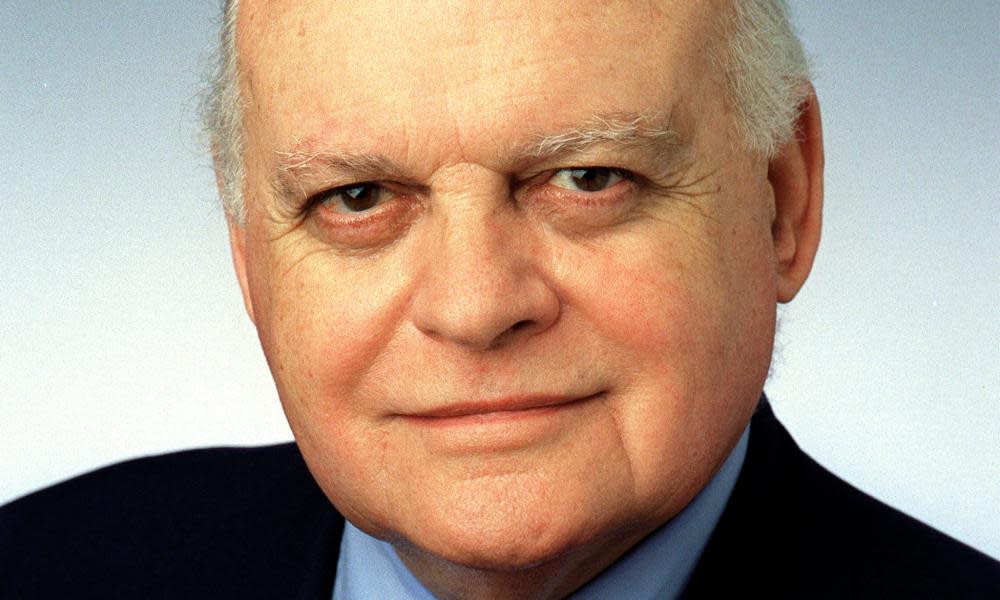Sir Peter Tapsell obituary

Each time Sir Peter Tapsell, the veteran Conservative MP, rose to speak in his later years, it was almost as if the Commons had been transported back five decades. Wearing his double-breasted pinstriped suit and with his ponderous and orotund oratory delivered with a drawling lisp, he seemed the embodiment of the last of the Tory knights of the shires, a figure from another age.
There was jocular speculation that Tapsell slept in three-piece pyjamas, and Ann Treneman once wrote in the Times: “I think of him as not a person so much as a stately home, large and imposing, so grand that like the best staircases he has to be polished at night.”
Yet appearances were deceptive. Although he spent more than 50 years in parliament and had a long career as a successful stockbroker behind him, Tapsell, who has died aged 88, was no buffer. A genial and approachable figure who spoke with authority and acuity, particularly on economic and foreign affairs, he was an MP of character and distinctiveness who was nobody’s patsy.
A Keynesian among Tory monetarists, he was the first Conservative to vote against a Tory chancellor’s finance bill since the 1930s when he opposed Geoffrey Howe’s notorious 1981 budget on the grounds (subsequently proved correct) that it would increase unemployment and wreck industry. He was opposed to capital punishment, against the European Union and was never one for serving on select committees.
Before Margaret Thatcher’s election victory in 1979 Tapsell had endured a brief and unhappy period as a member of the Tories’ opposition Treasury team, surrounded by monetarists – “the single biggest mistake I made in politics in my life,” he said later – before quietly resigning. He recalled words of advice given to him by Sir Winston Churchill during their only conversation in the Commons smoking room. The old man told him: “Never trust the bankers,” and Tapsell added: “I never have. I was a stockbroker – totally different.”
Despite his independent spirit, Tapsell remained on friendly terms with Thatcher – “I knew her before she was blond” – though he never subsequently attained ministerial office and became one of Michael Heseltine’s leading supporters when Heseltine unseated her in 1990.
Tapsell was born in Hove, East Sussex, the son of Jessie (nee Hannay) and Eustace Tapsell, a coffee estate manager in Africa who experienced unemployment in the 1930s after returning to the UK. “I can remember standing in a queue with [my father] when he was unemployed and my mother crying in the kitchen because we didn’t have money for the rent,” Tapsell recalled decades later.
It was an experience that coloured his views as a one-nation Tory. Despite some privations, the family was nonetheless able to send Peter for a private education at Tonbridge school in Kent. After national service as a subaltern in the Royal Sussex Regiment, he went to Merton College, Oxford where he gained a first in history, was a member of the Labour club and an office holder in the Oxford Union debating society.
After university he joined the Conservative research department and served the prime minister Anthony Eden as a personal assistant and speech writer. He unsuccessfully contested a byelection in the Black Country constituency of Wednesbury in 1957 before narrowly winning the normally Labour seat of Nottingham West in the “never had it so good” Tory landslide election of 1959.
The seat reverted to type in 1964, but Tapsell was elected two years later for the much safer rural Lincolnshire constituency of Horncastle, which transmogrified into East Lindsey in 1983 before evolving into Louth and Horncastle in 1997. He served that area for 49 years before deciding to step down at the 2015 general election. He was in parliament altogether for 54 years, contesting 14 elections, and from 2010 until 2015 was father of the house, its longest serving member. He was knighted in 1985.
As was formerly common, Tapsell combined his parliamentary service with an outside career – on the London Stock Exchange, where he worked for more than 30 years as an international investment adviser to foreign banks. He claimed to have stopped a run on the pound at the request of the Labour prime minister James Callaghan in the late 1970s by persuading his friend the Sultan of Brunei to buy £500m of gilts, a move that steadied the market. His stockbroking career made him seriously rich, with homes in Paris, Gstaad, Morocco and Barbados, as well as his constituency manor house and a London flat in Albany in Piccadilly.
Tapsell’s first marriage, in 1963 to Cecilia Hawke, ended in divorce; James, their son, died in 1985. In 1974 he married Gabrielle Mahieu, who survives him.
• Peter Hannay Bailey Tapsell, politician, born 1 February 1930; died 18 August 2018

 Yahoo News
Yahoo News 
